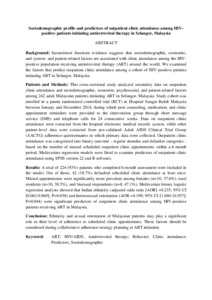Citation
Abdulrahman, Surajudeen Abiola and Rampal, Lekhraj and Othman, Norlijah and Ibrahim, Faisal and Hayati, Kadir Shahar and Radhakrishnan, Anuradha P.
(2017)
Socio-demographic profile and predictors of outpatient clinic attendance among HIV-positive patients initiating antiretroviral therapy in Selangor, Malaysia.
Patient Preference and Adherence, 11.
1273 - 1284.
ISSN 1177-889X
Abstract
Background: Inconsistent literature evidence suggests that sociodemographic, economic, and system- and patient-related factors are associated with clinic attendance among the HIV-positive population receiving antiretroviral therapy (ART) around the world. We examined the factors that predict outpatient clinic attendance among a cohort of HIV-positive patients initiating ART in Selangor, Malaysia.
Patients and Methods: This cross-sectional study analyzed secondary data on outpatient clinic attendance and sociodemographic, economic, psychosocial, and patient-related factors among 242 adult Malaysian patients initiating ART in Selangor, Malaysia. Study cohort was enrolled in a parent randomized controlled trial (RCT) in Hospital Sungai Buloh Malaysia between January and December 2014, during which peer counseling, medication, and clinic appointment reminders were provided to the intervention group through short message service (SMS) and telephone calls for 24 consecutive weeks. Data on outpatient clinic attendance were extracted from the hospital electronic medical records system, while other patient-level data were extracted from pre-validated Adult AIDS Clinical Trial Group (AACTG) adherence questionnaires in which primary data were collected. Outpatient clinic attendance was categorized into binary outcome - regular attendee and defaulter categories - based on the number of missed scheduled outpatient clinic appointments within a 6-month period. Multivariate regression models were fitted to examine predictors of outpatient clinic attendance using SPSS version 22 and R software.
Results: A total of 224 (93%) patients who completed 6-month assessment were included in the model. Out of those, 42 (18.7%) defaulted scheduled clinic attendance at least once. Missed appointments were significantly more prevalent among females (n=10, 37.0%), rural residents (n=10, 38.5%), and bisexual respondents (n=8, 47.1%). Multivariate binary logistic regression analysis showed that Indian ethnicity (adjusted odds ratio [AOR] =0.235; 95% CI [0.063-0.869]; P=0.030) and heterosexual orientation (AOR =4.199; 95% CI [1.040-16.957]; P=0.044) were significant predictors of outpatient clinic attendance among HIV-positive patients receiving ART in Malaysia.
Conclusion: Ethnicity and sexual orientation of Malaysian patients may play a significant role in their level of adherence to scheduled clinic appointments. These factors should be considered during collaborative adherence strategy planning at ART initiation.
Download File
![[img]](http://psasir.upm.edu.my/63243/1.hassmallThumbnailVersion/Sociodemographic%20profile%20and%20predictors%20of%20outpatient%20clinic%20attendance%20among%20HIV-positive%20patients%20initiating%20antiretroviral%20therapy%20in%20Selangor%2C%20Malaysia.pdf)  Preview |
|
Text (Abstract)
Sociodemographic profile and predictors of outpatient clinic attendance among HIV-positive patients initiating antiretroviral therapy in Selangor, Malaysia.pdf
Download (7kB)
| Preview
|
|
Additional Metadata
Actions (login required)
 |
View Item |

